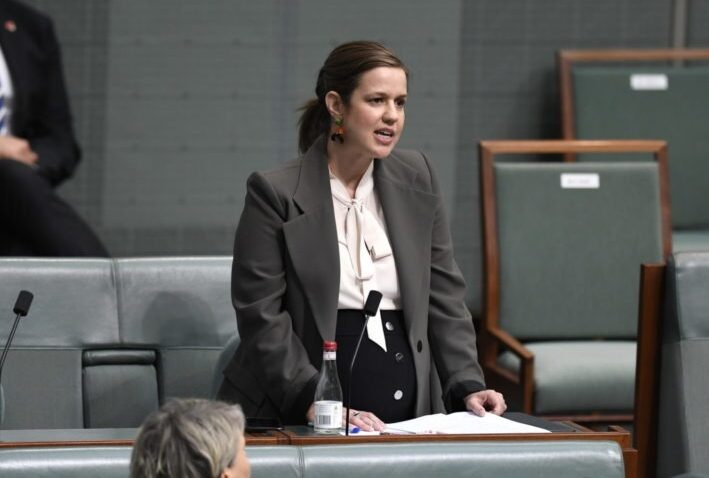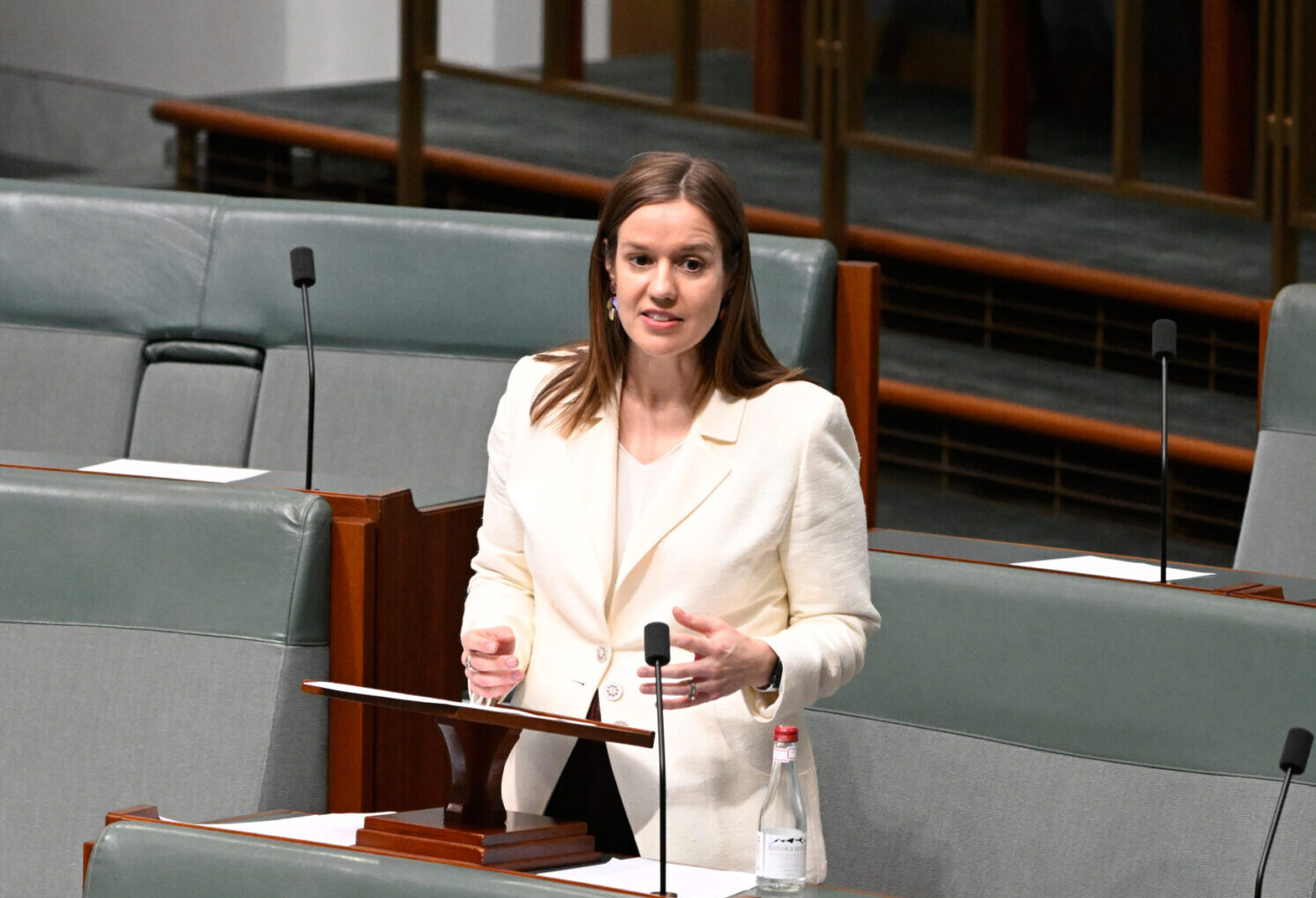This should be the workplace that sets the standard, but it has in no way been that workplace, and too many people, especially young women, have been harmed by that and by what has occurred here. It is now on all of us here to make the changes that have to happen. This shouldn’t be the building where the rules that apply in every other workplace in the country don’t apply. We are unique and special in this place because we make the rules. We make the rules that apply in all the workplaces. But we are not unique and special because we are above the rules, and that is absolutely what we must address and what this bill that we are talking about today goes some way towards doing.
It’s around a year since Brittany Higgins first publicly told her story, and I need to begin this speech by acknowledging her bravery and all the other women, current and former staffers, who have told their stories and who contributed to the Setting the Standard Report. Their contributions are immense, and I know for many of those people they were very difficult contributions to make, but they have been so important in getting us to the point we are right now. And it’s not just staffers of course. It’s not just women in politics and men in politics. People from across this building contributed—journalists from the press gallery, public servants, other staff who are all associated with this. They were really thorough and thoughtful contributions that should be part of making this a better place for everyone to work, and they obviously lead to a really thorough and thoughtful report from the Commissioner Kate Jenkins. I also want to thank her for giving us this report, which gives us a platform to make the changes that need to happen in this parliament to make it a safe workplace, especially for women.
This bill implements the recommendations 17 and 24 from Commissioner Kate Jenkins’s review. Recommendation 17 is that the Members of Parliament (Staff) Act should be amended to make it clear that the unfair dismissal provisions of the Fair Work Act apply to MOP(S) Act staff and that written notice of termination specifying the reasons for termination must be provided. Recommendation 17 also provides that it should be made clear that the Work Health and Safety Act applies to parliamentarians in their capacity as employers.
Recommendation 24 is that the Age Discrimination Act and the Disability Discrimination Act should be amended to clarify that these laws apply to MOP(S) Act staff. Why is this important? Because we know from what’s come in the report, from the discussions, from what people have put forward that too often staff in this building have felt afraid to come forward when they feel that they have been experiencing bullying, harassment or other unacceptable treatment. They’re told of a pattern of these types of allegations being dealt with like they are political allegations, not like they are professional allegations made in a professional workplace. So these are important reforms that go some way to making the changes needed in that space.
We’ve also heard from staff that these particular issues contributed to a feeling of a lack of job security, and that meant there was a power imbalance, and there is a power imbalance between those of us who are employers in this place and those people who are employees. Hopefully, these measures will go some way to fixing that imbalance to provide an environment where staff do feel confident and safe to come forward in the way they need to, to ensure that we do have a safe and supportive workplace for everyone.
Of course, this bill is just one small step—and it is a small step—in the process of making sure that we implement this review and we do make this a workplace that is safe for all. We had the statement of acknowledgement last week from the presiding officers, from the Prime Minister and from the Leader of the Opposition, and that was also an important step. We have our cross-party independently chaired leadership task force to oversee the implementation of Commissioner Jenkins’s recommendations, and we now have a joint standing committee on parliamentary standards to oversee standards and accountability in this place. So, again, some steps are being taken.
But what can’t happen with this work is what happens to too many reviews and too many efforts to change this place—that we put it on a shelf and say: ‘Job done! Good on us. We had a review and ticked some boxes. Let’s move on.’ This is a workplace that, across the country, people look to. If we cannot set the standard, if we cannot say to young women in this country that this is a place where they are safe to work, where they’re not just in the room but they are heard in the room and are safe in the room, we are absolutely not doing our jobs. I’m very proud that Labor has a commitment to ensure that this is a safe workplace. We will prioritise our staff as part of this process. We will make sure that their voices continue to be heard. This is their workplace, and we have a duty to all of them.
Doing this work will take leadership and commitment from all of us, and I want to highlight some of the crucial areas of change that Kate Jenkins outlined in her report. There are two areas that I think particularly relate to our roles as MPs and employers in this place. I will quote from Kate Jenkins’s speech here when she launched her report. The first area she called out is that we need is leadership. Our recommendations are focused on strengthening leadership to foster safe and respectful work environments. This includes both institutional leadership and individual leadership of parliamentarians, officeholders and party leaders. Leaders set the tone, and leadership at the top is particularly important to set clear expectations and role model safe and respectful behaviour.
I think if you asked many members of our community if that was the type of leadership they saw from this building at the moment, they might actually laugh in your face. We don’t meet those standards at the moment. We have a lot of work to do to meet those standards, and that is on all of us in this place, because every single one of us can contribute to that—to showing the leadership that comes from the top but that comes from everyone in this building. It’s going to be a crucial next step in getting the change we need.
The other area I want to highlight is needing to end the culture of entitlement and impunity that, for too long, has existed in this place. There do have to be consequences for poor behaviour. The report talks a lot and the debate around this has talked a lot about how this is a place that runs on power, and it absolutely does. But power shouldn’t be unchecked, and power shouldn’t mean that there aren’t consequences when you don’t do the right thing, when you cause harm to other people. So, again, I’m really pleased that this is something that Commissioner Jenkins picked up on in her report, and she made some very serious recommendations around how that power should be checked and how there should be accountability for behaviour in this place from employers. Again I will quote from her. She said:
The fourth is standards, reporting and accountability. We recommend establishing clear and consistent Codes of Conduct, alongside an independent complaint body, where it is safe to make a report, standards are enforced and people are held accountable through sanctions.
That is going to be so important if we are going to get change in this place.
I’ve been a staffer here and, like so many who have had that experience—and there are a number of us who are now elected who have had that experience—I came here because I believe in democracy and I believe in the power of the work that this place does. My experience as a staffer was positive, and that’s one of the reasons why I find it so devastating to hear the experiences of so many other staffers who have been absolutely failed and let down by what’s happened in this building. As an MP now, I rely on my staff and I know just how essential they are to keeping this place running. They deserve the respect of working in a professional and modern workplace, not a workplace that thinks the rules don’t apply to it, that somehow we are in a magical category where we can do whatever we like and there are no consequences. So I’m also very pleased that, as part of the report, there is a lot that goes to support for us as employers so we can actually do our jobs better and support our staff better and have a safer workplace.
I want to briefly pay tribute, as part of this speech, to all the women who have gone before those of us first-term female MPs in this place and who have done much of the hard work of beginning to make this a workplace that women are welcomed in, even if we still have a long way to go before women are safe here. Susan Ryan introduced the Sex Discrimination Act, which became law in 1984 under the Hawke government. There are the female and male MPs—and we have one sitting down the front here—who made this an easier workplace for women like me who have had babies and young families while in office. Those are changes that have happened relatively recently. So it does show us that progress can be made. It does show us that we can change this place. It is on all of us to continue that change, to make sure that women are not just here but that they are supported to be here, that they are safe, heard and know that this is a workplace that they can fully participate in.
The women of Australia have been very clear over the past year: they will not sit back and let their voices be ignored anymore. Young women, in particular, have been very clear with me and, I know, with many others that their voices will not be ignored. It’s a year since the March4Justice, and Australian women are still angry. They still don’t believe that this place has met their demands. Doing the work to get this House in order, to get our workplace in order, is crucial to showing we can deliver.

